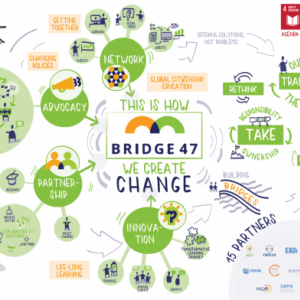
GCED Basic Search Form
Quick Search
You are here
News

In November 2019, Bridge 47’s ‘Envision 4.7’ event brought together 200 transformative education practitioners, civil servants, academics and civil society representatives from around the world to create a collaborative policy roadmap for the future implementation of Target 4.7 in Europe. The Roadmap featured six key target areas and 17 recommendations.
Following up on this, last week Bridge 47 hosted a webinar on ‘Envisioning More 4.7’, to present the activities and measures that have been taken to forward the Envision 4.7 Roadmap. Joined by over 80 participants, this webinar was an opportunity to welcome back many familiar faces of those who attended Envision 4.7., as well as to meet and collaborate with new participants and organizations.
Facilitated by Bridge 47 Network Officer Ricarda Motschilnig, the webinar featured four key speakers: Rilli Lappalainen, Director of FINGO and Chair of Bridge 47’s steering group; Ralph Carstens, Senior Research Advisor at the International Association for the Evaluation of Education; Elena Zacharenko and Adreia Oliviera, International Development consultants working for Bridge 47 and Brikena Xhomaqi, Director of LifeLong Learning Platform and part of Roadmap drafting group.
The Roadmap
The Roadmap’s creation was rooted, according to Rilli Lappalainen, in the existence of a space and need for holistic European action, specifically towards target 4.7. He emphasised the need for all types of education in the implementation of the SDGs, especially in today’s climate and circumstances. During the webinar, he introduced the key aspects of the Roadmap, stressing that: “How you measure the progress is the point. Not everything that is measured counts, but not everything that counts is measured.
When discussing the Roadmap and its relevance, Ralph Carstens brought up the parallels between the current COVID-19 situation and the purpose of the Bridge 47 network, as well as the Roadmap, when it comes to global education and education for sustainable development. In terms of finding new ways to do things, Ralph highlighted that “the world feels like an educational laboratory right now. A lot of rapid learning, not just how webinars work, but also for schools. It’s a big catalyst for digitalization and extended cooperation.” However, he also brought attention to the obstacles for equity and equality, pointing out that not everyone has the same resources to participate.
Brikena Xhomaqi, Director of LifeLong Learning Platform and part of Roadmap drafting group, discussed her experience at Envision 4.7, and explained the need to value lifelong learning beyond its economic value, seeing it as an opportunity to empower learns of all ages and to encourage personal growth and development. Echoing this sentiment, when asked what might bring us closer to the realization of target 4.7, Ralph pointed to how the role of teachers and the open classroom climate in discussing controversial, contested but also confusing issues really has a benefit to how students’ attitudes and their knowledge about these issues develop. These could easily be issues of global relevance such as health, environment and wellbeing.
Where are we now?
In the wake of Envision 4.7 and the creation of the Roadmap, Ralph Carstens says the Roadmap is key in bringing to life the rather abstract categories of target 4.7 and acting as a resource to bring greater clarity to the dimensions in the ways we discuss it. He stated that Bridge 47 could act as an excellent repository for the indicator work of target 4.7, recording what is going on both at the global and local level.
Building on this observed potential, Elena Zacharenko and Adreia Oliviera, who have been working closely with Bridge 47, presented their EU policy area mapping report, which outlines main policy areas that offer entry points for 4.7 advocacy. They have produced a mapping which follows the relevant areas for promoting this target in accordance with the priorities of the EU commission. The mapping aims to go beyond well-known policy areas with clear links, focusing rather on find ways to identify and promote proactive action. The matrix, which is divided into priority levels, outlines which EU policy areas complement the Roadmap’s six categories.
Questions and Discussion
Throughout the webinar, participants were able to submit questions for each speaker to answer. The quality of participant questions and the depth of discussion from each speaker made for an interesting and valuable discussion. Now more than ever, it is important to know collaboration and learning from one another is still possible in uncertain times.
Watch the full webinar: Click here
Related files: Click here
URL:
https://www.bridge47.org/index.php/news/04/2020/envisioning-more-47-webinar
